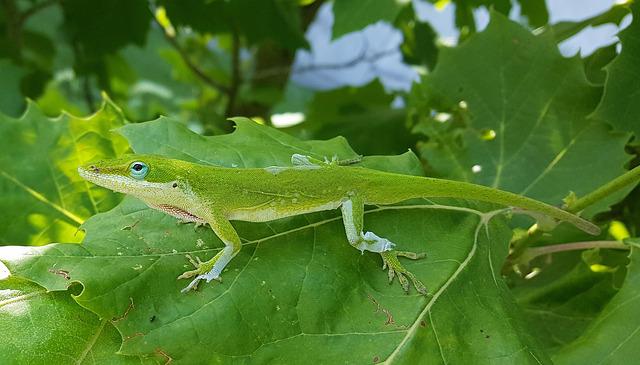If you have a green anole, you may have noticed that he seems stressed out lately. He might be acting differently than usual, or he might even be sick. This blog post will discuss the possible reasons why your anole is stressed and what you can do to help him feel better.
Why Is My Green Anole Stressed?
Green anoles can be easily stressed, which can lead to health problems.
Common causes of stress include changes in temperature, humidity, or light levels; tank mates; and lack of hiding places.
Stress can also be caused by handling, so it is essential to be gentle when handling your green anole.
If your green anole shows signs of stress, such as excessive shedding, decreased appetite, or lethargy, take action to identify and remove the source of stress.
You can help your green anole stay healthy and happy by providing a calm and comfortable environment.
Describe the signs that indicate an anole is stressed
When an anole is stressed, it often displays several physical and behavioral changes.
For example, the lizard may become more vocal, eat less, or lose interest in its surroundings. In addition, the anole may change color, becoming darker or paler than usual.
These changes are typically a response to changes in the anole’s environment, such as a sudden temperature drop or a predator’s presence.
If left unchecked, stress can lead to serious health problems like a metabolic bone disease.
Therefore, it is essential to be aware of the signs of stress in these lizards and take steps to minimize their exposure to stressful situations.
Why anoles become stressed and the solutions to reduce stress
Anoles become stressed for a variety of reasons.
Some of the most common causes of stress include changes in temperature, humidity, and light levels; overcrowding; and lack of food or water.
When stressed, anoles may stop eating, shed their skin excessively, or hide for long periods. In some cases, stress can even lead to death.
There are several ways to reduce stress in anoles. Providing a comfortable and stable environment is essential.
This means maintaining a consistent temperature, humidity, and light levels and providing adequate space and hiding places.
It is also essential to offer a variety of food items and to keep the enclosure clean and free of debris. By taking these steps, you can help your anoles stay healthy and stress-free.
Creating a Non-Stress environment for anoles
If you are thinking about getting an anole of your own, there are a few things you need to do to create a healthy environment for your pet.
- First, you must provide a cage at least 18 inches long and 12 inches wide. The cell should have plenty of ventilation and branches or other objects on which the lizard can climb.
- It is also essential to maintain a temperature in the cage between 75 and 80 degrees Fahrenheit. You can achieve this by using a basking lamp and heating pad.
- Finally, you will need a water dish for your lizard and mist the cage daily to provide additional moisture.
Following these simple tips can create a healthy environment for your pet anole.
Take action to help protect these lizards from becoming stressed.
When green anoles become stressed, their immune system weakens, making them more susceptible to diseases. Additionally, stressed green anoles are less likely to reproduce.
As a result, people need to take action to help protect these lizards from becoming stressed. One way to do this is to minimize human activity in areas where green anoles live.
Another way to help reduce stress levels in green anoles is to provide them with hiding places, such as log piles or rocks. These simple steps can help ensure that green anoles remain a part of our ecosystem for years to come.




